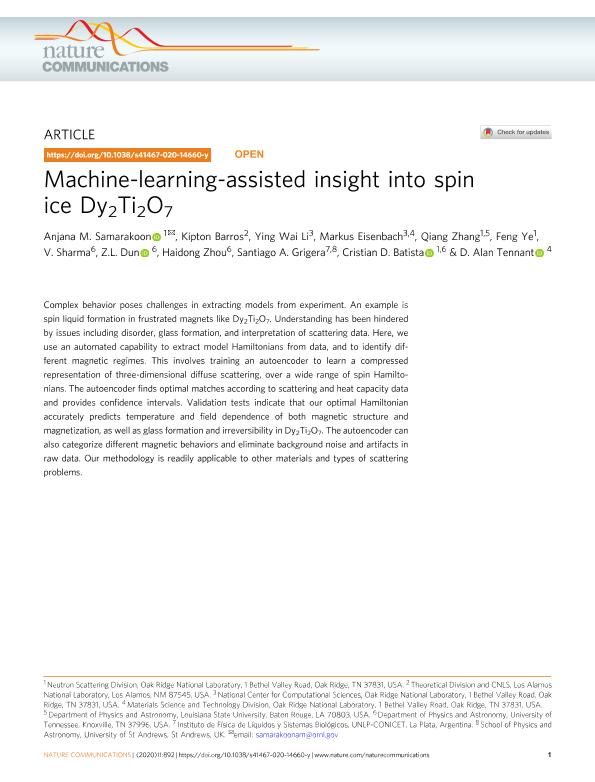Artículo
Machine-learning-assisted insight into spin ice Dy2Ti2O7
Samarakoon, Anjana M.; Barros, Kipton; Li, Ying Wai; Eisenbach, Markus; Zhang, Qiang; Ye, Feng; Sharma, V.; Dun, Z. L.; Zhou, Haidong; Grigera, Santiago Andrés ; Batista, Cristian D.; Tennant, D. Alan
; Batista, Cristian D.; Tennant, D. Alan
 ; Batista, Cristian D.; Tennant, D. Alan
; Batista, Cristian D.; Tennant, D. Alan
Fecha de publicación:
14/02/2020
Editorial:
Nature Publishing Group
Revista:
Nature Communications
e-ISSN:
2041-1723
Idioma:
Inglés
Tipo de recurso:
Artículo publicado
Clasificación temática:
Resumen
Complex behavior poses challenges in extracting models from experiment. An example is spin liquid formation in frustrated magnets like Dy2Ti2O7. Understanding has been hindered by issues including disorder, glass formation, and interpretation of scattering data. Here, we use an automated capability to extract model Hamiltonians from data, and to identify different magnetic regimes. This involves training an autoencoder to learn a compressed representation of three-dimensional diffuse scattering, over a wide range of spin Hamiltonians. The autoencoder finds optimal matches according to scattering and heat capacity data and provides confidence intervals. Validation tests indicate that our optimal Hamiltonian accurately predicts temperature and field dependence of both magnetic structure and magnetization, as well as glass formation and irreversibility in Dy2Ti2O7. The autoencoder can also categorize different magnetic behaviors and eliminate background noise and artifacts in raw data. Our methodology is readily applicable to other materials and types of scattering problems.
Palabras clave:
MACHINE LEARNING
,
CONDENSED MATTER
,
FRUSTRATION
,
MAGNETISM
Archivos asociados
Licencia
Identificadores
Colecciones
Articulos(IFLYSIB)
Articulos de INST.FISICA DE LIQUIDOS Y SIST.BIOLOGICOS (I)
Articulos de INST.FISICA DE LIQUIDOS Y SIST.BIOLOGICOS (I)
Citación
Samarakoon, Anjana M.; Barros, Kipton; Li, Ying Wai; Eisenbach, Markus; Zhang, Qiang; et al.; Machine-learning-assisted insight into spin ice Dy2Ti2O7; Nature Publishing Group; Nature Communications; 11; 14-2-2020; 1-9
Compartir
Altmétricas



